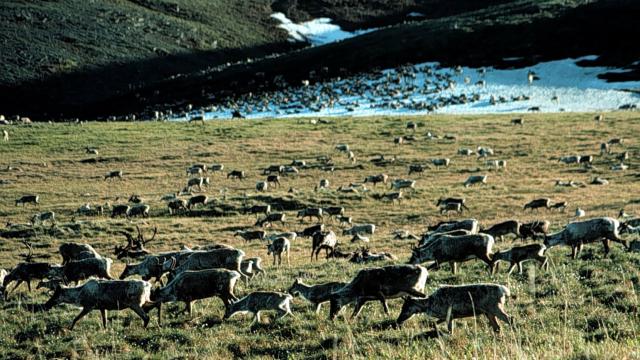Because this is the year when things continually go from bad to worse to even worse, the Trump administration approved an oil leasing program for the Arctic National Wildlife Refuge (ANWR).
Interior Secretary David Bernhardt — a former oil and gas lobbyist — announced the decision on Monday. The move will open up 1.56 million-acre area of the Alaskan refuge’s pristine coastal plain area to drilling for the first time.
The refuge, which totals 19 million acres in size, has been off-limits to drilling for decades. But in 2017, a tax bill passed that laid the groundwork for the area to be opened up to oil and gas leasing. Bernhardt said his department could hold a sale of oil and gas leases in ANWR by the end of the year, and drilling could begin within eight years, Reuters reports.
[referenced id=”1228930″ url=”https://gizmodo.com.au/2020/07/the-oil-industry-threatens-alaskan-polar-bears-in-their-dens/” thumb=”https://gizmodo.com.au/wp-content/uploads/2020/07/08/r8hifpdob1wq9f6xnpi7-300×169.jpg” title=”The Oil Industry Threatens Alaskan Polar Bears in Their Dens” excerpt=”Pregnant polar bears enter dens when they give birth for up to eight months. The process makes bear mums super vulnerable — they fast, surviving off the fat on their bodies, and can lose up to 43% of their body weight. And in that environment, the mums must care for…”]
Leasing the area to extractive industries will put species at danger which are already at risk. Some 200,000 migrating Porcupine caribou, for instance, spend their summers on ANWR’s coastal plain, as do migrating waterfowl. The area is also home to about 900 polar bears who will be put at risk by the fossil fuel industry’s machinery.
The administration’s Monday decision will also put indigenous communities at risk. People of the Gwich’in Nation, for instance, rely on the Porcupine caribou for food and cultural ceremonies. Dangers to both Arctic species and indigenous communities could also be exacerbated if drilling in the region results in a spill.
“A spill would be especially devastating — and difficult to clean up — in the fragile Arctic environment,” Tim Donaghy, senior research specialist at Greenpeace USA, said in an email.
And the climate impacts could be severe, too. An analysis from the Centre for American Progress based on the administration’s estimate projects that oil companies will be able to extract up to 10 billion barrels from the Arctic Refuge over a 70-year period. That could mean lease sales would result in the release of over than 4.3 billion metric tons of carbon dioxide, about three quarters of the totality of the U.S.’s annual emissions.
“The Arctic is already warming faster than any region in the world,” said Donaghy. “Digging up and burning Arctic oil would push us way past 1.5 degrees Celsius of warming and cause severe disruptions to Arctic ecosystems, including in Alaska.”
Opening ANWR up for oil and gas companies is broadly unpopular. An April Yale and George Mason University poll found that 67 per cent oppose drilling in the refuge. But despite the broad lack of support for the move, it may be hard to undo the wheels that have been set in motion. Repealing it would likely require Democrats to take control of both the White House and the Senate this fall.
“Congress mandated the lease sales and Congress can remove them. In fact, the House of Representatives passed this bill in 2019, but it’s not been taken up by the Senate,” said Donaghy. “A unified Democratic Congress and president could pass that bill, reverse the decision, and protect the Arctic Refuge from oil and gas drilling.”
Editor’s Note: Release dates within this article are based in the U.S., but will be updated with local Australian dates as soon as we know more.
